Loyalty, intelligence, bravery, and protectiveness – these are just a few of the traits that make dogs so beloved. But these qualities also make them invaluable partners for law enforcement, helping to keep our communities safe. Police dog breeds, also known as K-9s (a play on the word “canine”), have been assisting law enforcement for over a century, fulfilling diverse roles to combat crime and save lives. Becoming a police dog requires rigorous training to ensure the right skills and temperament for the job. Here are ten breeds that consistently demonstrate the qualities needed for a successful career on the force.
1. German Shepherd
The German Shepherd is practically synonymous with police work. Their regal bearing and intelligence are instantly recognizable. If you’ve ever seen a dog accompanying law enforcement at an airport or train station, it’s highly likely to be a German Shepherd. Renowned for their poised disposition, exceptional trainability, and high intelligence, German Shepherds are perfectly suited for diverse roles. They excel at tasks like detecting contraband and locating victims in natural disasters. Their abilities and strong work ethic also make them popular military and service dogs.
2. Belgian Malinois
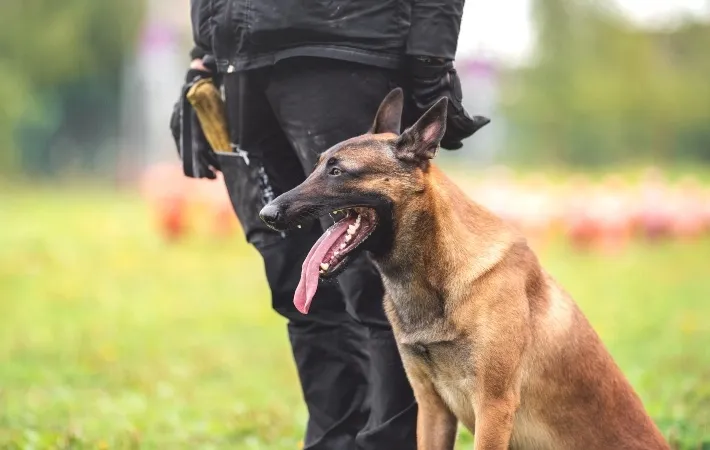 Belgian Malinois police dog attentively listening to instructions from its handler.
Belgian Malinois police dog attentively listening to instructions from its handler.
The Belgian Malinois is often mistaken for a German Shepherd due to its similar appearance with tall, pointed ears and muscular build. However, the Belgian Malinois is typically lighter and can be more energetic. While their high-strung nature might seem unsuitable for police work, dogs who can channel that energy make outstanding K-9 unit members. Their natural athleticism and exceptional sense of smell allow them to excel in roles ranging from sniffing out explosives to apprehending criminals. Belgian Malinois also react quickly, making them reliable partners in high-pressure situations.
3. Bouvier des Flandres
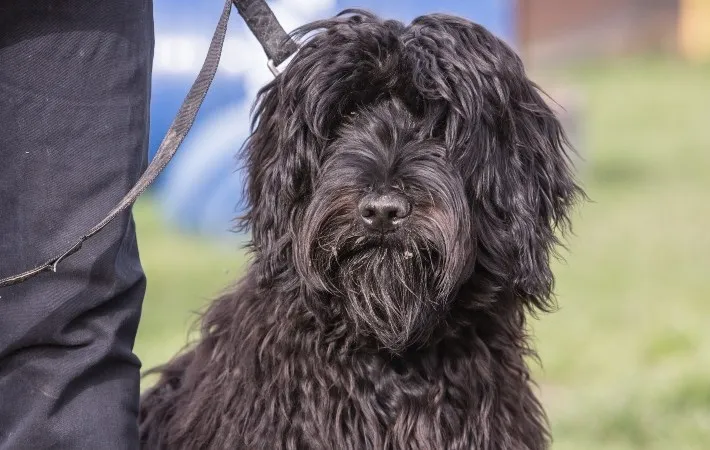 A Bouvier des Flandres on a leash, showcasing its shaggy coat and sturdy build.
A Bouvier des Flandres on a leash, showcasing its shaggy coat and sturdy build.
The Bouvier des Flandres, pronounced “boo-vyey-duh-flan-ders,” might appear more like a cuddly companion than a police dog breed at first glance. However, beneath that shaggy double coat lies a burly, muscular body ideally suited for search and rescue operations. Excellent obedience and a docile temperament further enhance their skillset, as these even-keeled dogs are eager to assist their handlers. While more common in European law enforcement, the Bouvier des Flandres’ incredible abilities are valuable assets anywhere.
4. Bloodhound
![]() A Bloodhound intently tracking a scent, showcasing its powerful nose.
A Bloodhound intently tracking a scent, showcasing its powerful nose.
Bloodhounds are famous for their powerful sense of smell, but its true value is often underestimated. Their noses are so sensitive that Bloodhound evidence is legally admissible in some U.S. courts, a fact recognized by Guinness World Records. These dogs can follow scents for miles, making them invaluable for tracking down missing individuals, including children, as Bloodhounds are known for their calm demeanor around kids. They’re also used to match crime scene evidence to suspects; a Bloodhound’s sense of smell is virtually impossible to deceive.
5. Dutch Shepherd
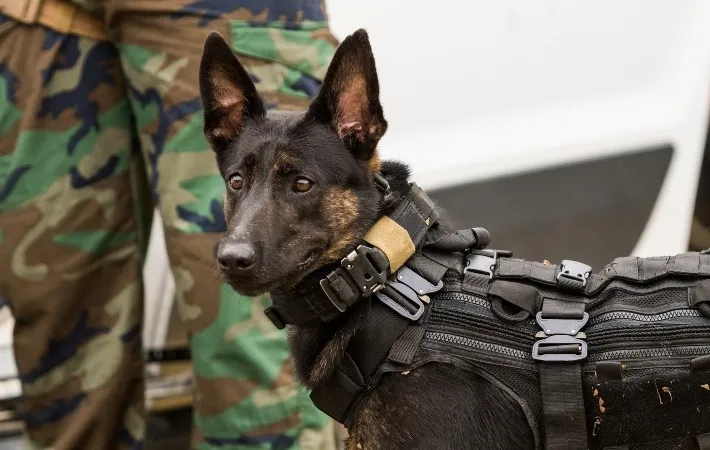 A Dutch Shepherd police dog displaying alertness and focus.
A Dutch Shepherd police dog displaying alertness and focus.
The Dutch Shepherd, while less widely known than other shepherd breeds, is among the smartest and most alert K-9 dog breeds. They are quick learners with a strong work ethic, allowing them to excel in various police duties. Search and rescue and detection work are key areas where this breed shines, and their athleticism often leads them to participate in dog sports and herding activities. Their quick-witted nature and athleticism make them exceptionally versatile.
6. Doberman Pinscher
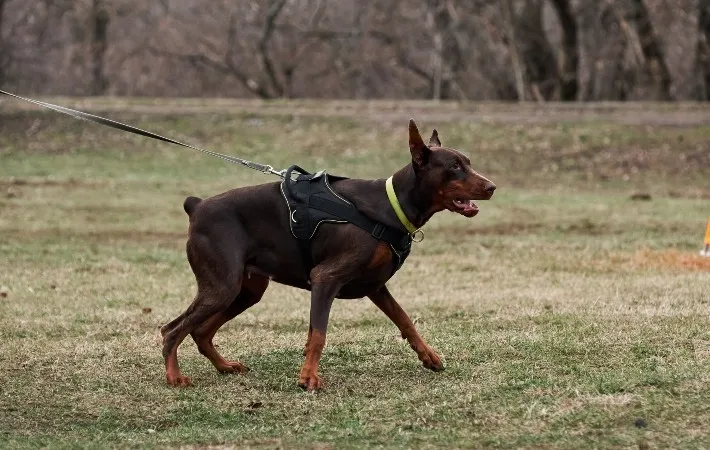 A Doberman Pinscher police dog showcasing its strength and agility.
A Doberman Pinscher police dog showcasing its strength and agility.
The strong and agile Doberman Pinscher was originally bred as a watchdog, making it a natural fit for law enforcement. Many units train them to apprehend fleeing criminals. Despite their tough reputation, Dobermans are highly disciplined and are trained to apprehend without causing unnecessary harm. Courageous and active, Dobermans are reliable police dogs, welcomed by departments seeking dedicated partners.
7. Labrador Retriever
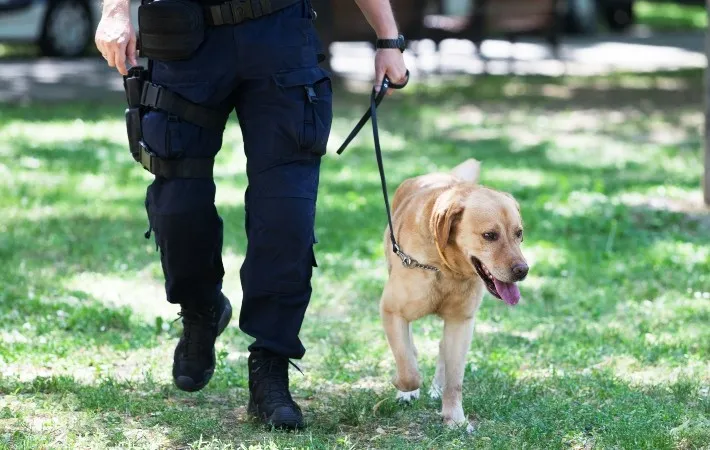 A Labrador Retriever with a police officer, highlighting their friendly nature in a law enforcement setting.
A Labrador Retriever with a police officer, highlighting their friendly nature in a law enforcement setting.
The Labrador Retriever, the most popular dog breed in America, is also a top choice for K-9 assignments. They frequently assist law enforcement in high-traffic areas, helping to sniff out narcotics and other illegal substances. While their protective instincts contribute to their effectiveness, a more surprising reason for their selection is their non-threatening appearance. Many people don’t perceive Labs as a threat, which helps alleviate public apprehension in policed areas. Even while on duty, Labs contribute to a sense of calm and reassurance.
8. Beagle
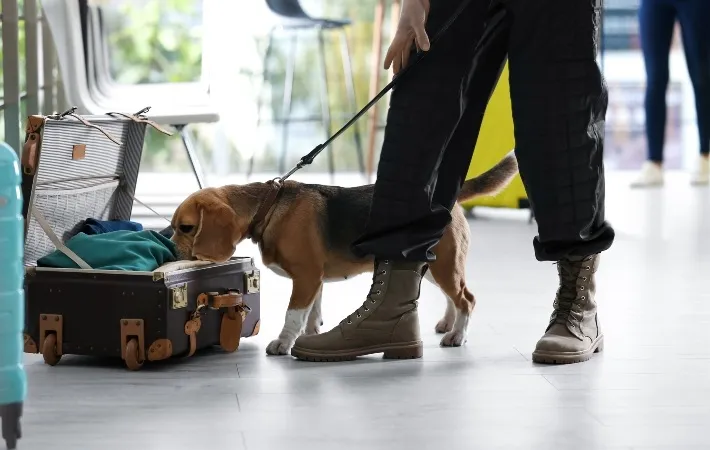 A Beagle police dog sniffing a suitcase, demonstrating its keen sense of smell for detection.
A Beagle police dog sniffing a suitcase, demonstrating its keen sense of smell for detection.
While the energetic Beagle might not immediately come to mind as a model K-9, they possess two key advantages: their size and their exceptional sense of smell. Beagles’ sensitive noses can locate drugs and food, a valuable asset at customs agencies. Their compact size allows them to easily navigate tight spaces, such as security conveyor belts. Beagles with a docile demeanor and a willingness to obey commands are the most suitable candidates for this type of work.
9. American Pit Bull Terrier
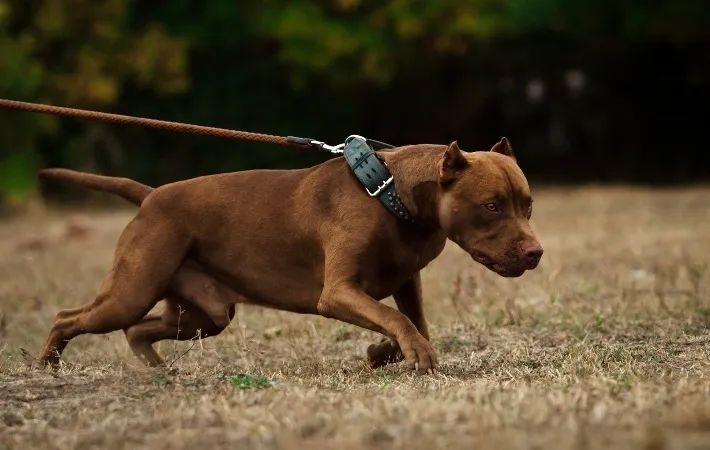 An American Pit Bull Terrier on a leash, displaying confidence and strength.
An American Pit Bull Terrier on a leash, displaying confidence and strength.
The American Pit Bull Terrier is a more recent addition to law enforcement. While known for their confidence and strength, their increasing presence is primarily due to cost-effectiveness. Fully training a traditional police dog can be expensive, costing upwards of $15,000, according to the National Police Dog Foundation. Many Pit Bulls, however, come from rescues, saving police departments money while offering the same essential abilities as other breeds. Employing these dogs not only saves them but also helps dispel the Pit Bull’s reputation as aggressive and dangerous. They can often be found patrolling with officers or sniffing for illegal items.
Protecting and Serving Together
The most effective police dogs come in diverse breeds and sizes, each contributing unique skills to law enforcement. Even breeds not traditionally associated with police work can possess special abilities that help protect our communities. From our own loyal companions to the brave four-legged members of the force, dogs consistently stand by our side when we need them most, showcasing their unwavering dedication to protecting and serving.
